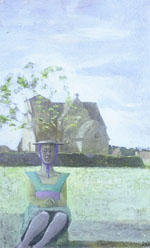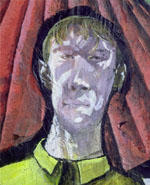The boy
was but eight years old, and spent his days in the company
of neighbouring farmers. His family had moved to a rural abode where they might subsist for
as long as foreign troops controlled their nation's soil.
Food was abundant there, but children were few.  The
local farmers had become the boy's friends; and living
in grandfather's stone house was good enough, except
for the punishments. Even at his age he recognised that
the grounds for condemnation were insufficient, knew that
the justifications his parents gave were flimsy, were
arbitrary, almost eager pouncing upon his unkind words or thoughtless slights to his younger sister, whom he came
to detest. The punishments were cruel and bizarre
because inexplicably suspended. Heavy sanctions were declared, assigned a latent state,
and stored up for application
at some specific,
future date.
The
local farmers had become the boy's friends; and living
in grandfather's stone house was good enough, except
for the punishments. Even at his age he recognised that
the grounds for condemnation were insufficient, knew that
the justifications his parents gave were flimsy, were
arbitrary, almost eager pouncing upon his unkind words or thoughtless slights to his younger sister, whom he came
to detest. The punishments were cruel and bizarre
because inexplicably suspended. Heavy sanctions were declared, assigned a latent state,
and stored up for application
at some specific,
future date.
'You
will be shut in your room in two days time,' he was told.
'Do
it to me now,' he cried, 'why in two days?' No, only at
the appointed hour would he be padlocked in for a morning,
for an afternoon and an evening, sometimes longer. Once
he was confined two nights and a day in the bathroom,
taking his meals by the sink, and sleeping in the tub.
He couldn't know that his parents were fighters in the
resistance, that his grandfather's
house was a way station for escaped
prisoners
and downed aviators, and that the local farmers had become
too accustomed to accommodation, had made too much money
selling to the occupying army to be allowed to hear from
a small boy of visitors to his grandfather's house.
 Years
later, he fought for his country in yet another war, leading
fifty men of his own age, and using caution as his principal
weapon. He ringed the villages he was ordered to capture,
sent in ample warning, reduced the place to rubble, and
had his soldiers poke in the ruins. He never lost a man.
Years
later, he fought for his country in yet another war, leading
fifty men of his own age, and using caution as his principal
weapon. He ringed the villages he was ordered to capture,
sent in ample warning, reduced the place to rubble, and
had his soldiers poke in the ruins. He never lost a man.
Afterward
he returned home to his nation's capital and engaged the
pursuit of a beautiful girl. His bid for marriage met
stern opposition from her parents,
who never assented, only
conceded when informed of a conception. His union was
blessed with children; but like a sentence
held in abeyance ten years then abruptly enforced,
terminal illness declared itself
in their eldest child, sweeping the infant to death in a matter
of weeks.
His marriage sundered. He dressed solitude at first in stillborn wanderings,
later in sterile liaison, and at last, yet tossing on internal seas, returned
to his wife. He bit off the  minutes
on tobacco's butt ends, strung together his hours in alcohol's
sleek stream. Now and again his eyes appeared lucid in
an ashen face. His body resisted as best it could the poison's onslaught, growing thin, writhen, and eventually succumbing. He nuzzled close to nothingness on a hospital bed, given up for lost amongst
vital organs in collapse. His condition denied him
even anaesthetic oblivion, making
hallucination his only palliative to agony.
minutes
on tobacco's butt ends, strung together his hours in alcohol's
sleek stream. Now and again his eyes appeared lucid in
an ashen face. His body resisted as best it could the poison's onslaught, growing thin, writhen, and eventually succumbing. He nuzzled close to nothingness on a hospital bed, given up for lost amongst
vital organs in collapse. His condition denied him
even anaesthetic oblivion, making
hallucination his only palliative to agony.
Pain
and delirium played through his
body for ten days. His first-born was alive again, cowering in Grandfather's house. The farmers lay dead in smoking ruins picked over by soldiers. He followed his wife's progress
by her voice, trailed it through a crowded salon while
dictating in a foreign language to an employee lying
prostrate beneath
a chair. Each day at bedside,
the man's second son read
the news to him, recapitulated political vagaries,
financial trends, and sporting results.
The lad received in recompense only silence from the comatose,
all but a corpse of a father in the critical ward.
Whether
a further rung on karma's ladder, mere spills from hazard's pouch,
or the hard bargain of original sin, those ten days were
a final atonement. The patient slipped from death's grip
to emerge in a world of gritty, monotone grey.
![Afternoon in the Park | Sarah Raphael [detail]](img00250.jpg) Months
afterwards, there came a slow annealing of mental activity,
hints of colour leaking in from the corners of his sight.
Now he
had the dignity, the gravity of one beyond all judgement. It is to his credit
that when offered freedom's expanse, he sat in virtue's circle. Branded
at last with immunity, he chose honesty's path, as best
he could devise it.
Months
afterwards, there came a slow annealing of mental activity,
hints of colour leaking in from the corners of his sight.
Now he
had the dignity, the gravity of one beyond all judgement. It is to his credit
that when offered freedom's expanse, he sat in virtue's circle. Branded
at last with immunity, he chose honesty's path, as best
he could devise it.